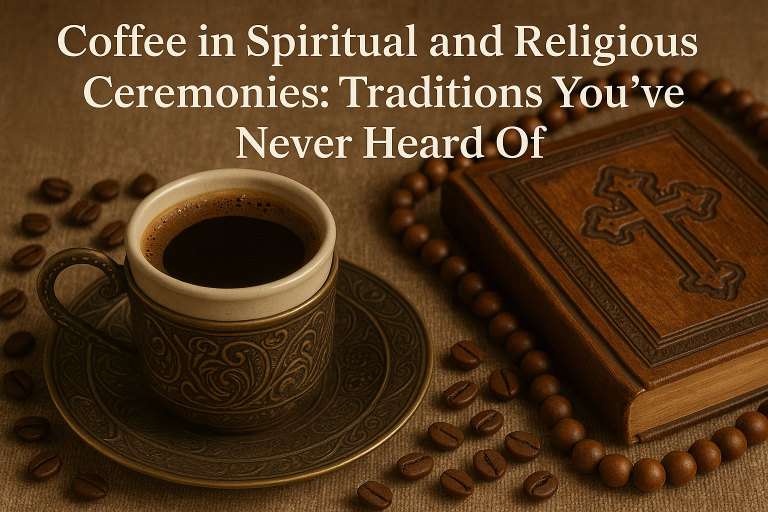
Coffee is more than just a beverage — in many cultures, it has deep spiritual and symbolic meaning.
Long before coffee shops became global icons, this humble brew was used in rituals, prayers, and sacred ceremonies. Across continents and belief systems, coffee has served as a bridge between the physical and the divine.
In this article, we’ll explore the surprising role coffee plays in religious and spiritual practices around the world, from ancient Sufi ceremonies to Ethiopian rituals and modern-day spiritual circles.
Coffee’s story begins in the highlands of Ethiopia, where legend tells of Kaldi, a goat herder who noticed his animals becoming energetic after eating red berries from a coffee tree.
While this tale is more folklore than fact, it hints at coffee’s early mystical associations.
When coffee spread from Ethiopia to Yemen in the 15th century, it quickly became a part of religious practice.
Sufi monks in Yemen used coffee during late-night dhikr ceremonies — a form of chanting and meditation meant to bring the practitioner closer to God.
The caffeine helped them stay awake and alert through long hours of prayer and contemplation. But it wasn’t just a stimulant — coffee became part of a sacred ritual, prepared and shared with reverence.
Sufi mysticism, a branch of Islam focused on personal union with the divine, embraced coffee as both a physical and spiritual tool.
In Sufi gatherings, or majlis, followers would drink coffee in a ritualistic manner before engaging in hours of dhikr (chanting God’s name).
These ceremonies often included music, poetry, and rhythmic movements. Coffee was not just a drink — it was seen as a purifier, a way to focus the heart and mind on spiritual truth.
Many scholars believe that coffee was first consumed in religious settings before entering the secular world. In this sense, coffee’s first cultural home was a sacred one.
In Ethiopia, the birthplace of coffee, the coffee ceremony is a profound daily ritual that blends spirituality, community, and tradition.
Conducted primarily by women, the ceremony involves roasting green beans over an open flame, grinding them by hand, and brewing the coffee in a jebena (a traditional clay pot). The aroma of roasting beans fills the room, often accompanied by incense.
The coffee is served in three rounds:
These rounds are not just about taste — they represent a spiritual journey. Sharing coffee during the ceremony strengthens social ties, honors guests, and invites blessings from ancestors and spirits.
Some Ethiopians also say prayers or give thanks to God during the ritual, acknowledging coffee as a gift of life.
While coffee doesn’t play a direct role in Christian liturgy, it holds spiritual value in many Christian communities — especially in fellowship practices.
The concept of “coffee hour” after Sunday services is common in Protestant churches, especially in North America and parts of Europe.
This post-worship gathering isn’t just social — it reflects deeper principles of hospitality, communion, and unity.
Sharing coffee in this context becomes a symbolic act of building relationships, welcoming newcomers, and extending the warmth of the spiritual community into everyday life.
In some modern Christian retreats and workshops, coffee is included as part of spiritual reflection time — offering space for journaling, prayer, or quiet contemplation.
Among some Rastafarian communities, especially those with Ethiopian heritage, coffee holds spiritual importance.
It connects followers to Ethiopian roots and is sometimes used in religious gatherings or as part of Ital — the natural lifestyle philosophy of Rastafarians.
Coffee’s use is often symbolic of grounding, energy, and divine presence. While it’s not a widespread sacrament in Rastafarianism, it may be shared during spiritual conversations or communal meditations.
In Central and South America, where coffee has been cultivated for centuries, Indigenous communities sometimes incorporate coffee into traditional blessing ceremonies, though not as commonly as other sacred plants like cacao or tobacco.
In some Andean or Amazonian traditions, coffee is offered to Pachamama (Mother Earth) during harvest festivals, asking for abundance and harmony with nature.
The offering might include coffee beans, flowers, coca leaves, and other symbols of gratitude.
Though these uses are regional and not widely documented, they reflect how coffee can enter spiritual life as an offering of thanks, energy, and reverence.
In today’s world, many people use coffee in their personal spiritual practices, blending ancient wisdom with modern routines.
The act of preparing coffee can be turned into a mindfulness ritual — choosing beans intentionally, grinding them slowly, breathing in the aroma, and brewing with full presence. This transforms a daily habit into a spiritual anchor.
Many people practice gratitude during this process, silently giving thanks for the farmers, land, water, and effort behind each cup.
Morning journaling sessions often begin with a warm cup of coffee. Writers, creatives, and spiritual seekers use this quiet time to reflect, set intentions, and connect with their inner voice.
This ritual isn’t attached to a specific religion but reflects how coffee can create space for soulful reflection.
In some New Age or metaphysical practices, coffee is believed to have grounding properties. People may use coffee beans or grounds in energy clearing rituals, placing them in bowls in corners of a room or using them symbolically to absorb negativity.
While not rooted in ancient tradition, these practices highlight how modern spirituality continues to find meaning in everyday elements — including coffee.
Across all these traditions, one theme stands out: connection.
Coffee connects people to one another, to their ancestors, to the Earth, and in many cases, to the divine. Whether it’s sipped in silence, passed among friends, or brewed as part of a sacred rite, coffee becomes a vessel of presence and intention.
This is why it’s found in so many spiritual settings — not because it’s mystical in itself, but because it opens a space where something deeper can happen.
Coffee is more than fuel. For many around the world, it’s a sacred ritual, a gesture of respect, a moment of clarity. It bridges body and spirit, helping people wake up not just physically, but spiritually.
The next time you brew a cup, slow down. Feel the heat, smell the roast, and consider the ancient hands that once did the same. In that moment, your cup becomes more than a drink — it becomes a connection to centuries of sacred tradition.

Gabriel Rodrigues é especialista em finanças pessoais e escritor, com ampla experiência em economia, planejamento financeiro e gestão de recursos. Apaixonado por ajudar as pessoas a alcançarem sua saúde financeira, ele explora temas variados, desde investimentos até estratégias de poupança. Quando não está escrevendo, você pode encontrá-lo estudando novas tendências financeiras e oferecendo consultoria para quem busca melhorar sua relação com o dinheiro.